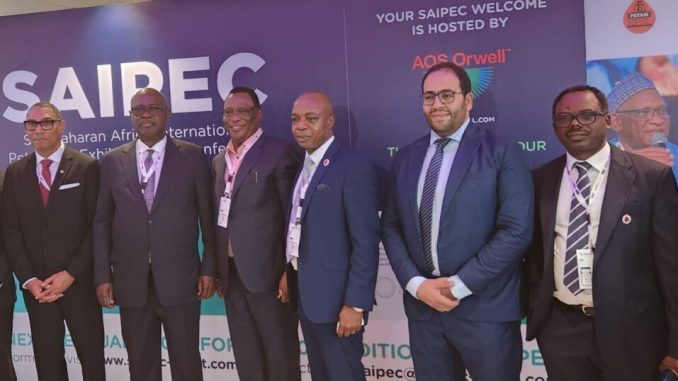
The Federal Government, through the Minister of State for Petroleum Resources (Oil), Senator Heineken Lokpobiri, has declared that the country is at the forefront of a transformative energy revolution in Africa. Speaking during the Sub-Saharan Africa International Petroleum Exhibition and Conference (SAIPEC) 2025, to an audience of industry leaders, policymakers, and innovators, Lokpobiri emphasised that Nigeria’s focus on local content and indigenous empowerment is the key to unlocking Africa’s true energy potential.
Themed ‘Building Africa’s Future: Advancing Local Content and Sustainable Development in the Oil and Gas Industry,’ Lokpobiri noted that “Local content is no longer a luxury; it is the key to unlocking Africa’s true potential.”
Lokpobiri also announced the creation of the African Energy Bank (AEB), which is to be based in Nigeria, describing it as a game-changer for financing energy projects across the continent.
“What we’ve seen in Nigeria is proof that African nations can take full ownership of their resources and transform them into engines of prosperity,” Lokpobiri said. “We’ve revitalised dormant assets, expanded production, and kept more value within our economy.”
The Minister made it clear that the path forward requires a collective effort from all of Africa. “We must unite. We must share knowledge, close funding gaps, and harmonise regulations,” he urged, calling for regional collaboration that could reshape the continent’s energy future.
“This institution has the potential to revolutionise energy financing by providing funding tailored to Africa’s unique needs, thus reducing reliance on foreign capital,” he stressed.
Addressing the challenges of global energy transitions, Lokpobiri framed the global transition to cleaner energy not as a threat, but as an opportunity for Africa to lead the world.
“We must optimise our hydrocarbon resources while simultaneously investing in renewable energy to ensure long-term energy stability,” he asserted. “The future belongs to those who embrace change—and Africa must be at the forefront.”
In a call to action, he urged for regional collaboration, investment in human capital, and greater transparency to secure Africa’s energy future.
“This is not just another chapter in Nigeria’s energy story—this is the dawn of a new era. Nigeria is not just adapting to change; we are shaping it,” he declared.
With Nigeria leading the charge, SAIPEC 2025 marks a pivotal moment for Africa’s energy landscape, setting the stage for a future characterised by self-reliance, innovation, and sustainable development.
Group Chief Executive Officer of NNPC Limited, Mallam Mele K. Kyari, also emphasised the need for increased collaboration and investment to build a resilient and sustainable energy future for Africa.
Speaking at the 9th Sub-Saharan Africa International Petroleum Exhibition and Conference (SAIPEC), Kyari noted the continent’s crucial role in ensuring energy availability, affordability, and sustainability.
“With Africa’s growing population, energy demand is set to rise significantly. To meet these needs, we must focus on energy transition, efficiency, investment, and innovation while leveraging indigenous resources,” Kyari explained.
He reaffirmed NNPC’s commitment to expanding Nigeria’s gas infrastructure, citing projects such as the Ajaokuta-Abuja-Kano (AKK) gas pipeline and the OB3 gas interconnector.
These initiatives are expected to support 5 billion standard cubic feet per day of domestic gas utilisation and contribute 5GW of power generation capacity.
Kyari also highlighted Nigeria’s push towards cleaner energy sources, noting that the country’s “Decade of Gas” initiative (2021-2030) is designed to position natural gas as a key driver of industrialisation.
Furthermore, he pointed to ongoing projects such as NLNG Train 7 and the Nigerian-Morocco and Trans-Saharan Gas Pipelines, which are set to expand Nigeria’s liquefied natural gas (LNG) production and enhance regional energy security.
“Balancing energy transition, market realities, and energy security requires strategic investment, local content development, and stronger regional partnerships,” Kyari concluded, calling on stakeholders to work together to advance Africa’s energy sector.
The Executive Secretary of the Nigerian Content Development and Monitoring Board (NCDMB), Engr. Felix Omatsola Ogbe, called for a unified local content strategy across Sub-Saharan Africa to boost industrialisation and economic growth in the region.
Speaking at the 9th Sub-Saharan Africa International Petroleum Exhibition and Conference (SAIPEC), he stressed that the fragmented implementation of local content policies continues to impede progress in the oil and gas sector.
Ogbe outlined several key pillars for collaboration, including the harmonisation of local content policies, human capital development, infrastructure investment, funding provisions, and technology transfer.
He also highlighted the African Continental Free Trade Agreement (AfCFTA) as a vital tool in fostering regional partnerships.
“Africa must leverage its collective strengths to create a formidable and self-reliant petroleum sector,” Ogbe stated, urging governments, industry players, and financial institutions to work together to enable indigenous participation.
Ogbe further commended President Bola Ahmed Tinubu’s recent Executive Order, which has reduced Nigeria’s oil and gas contracting cycle from 36 months to six months. This move, he noted, will accelerate project approvals and strengthen investor confidence.
The NCDMB continues to expand collaborations, having signed agreements with countries such as Senegal, Ghana, and Uganda to support their local content frameworks.
The agency is also spearheading initiatives such as the “Back to the Creek” project, aimed at equipping youth in oil-producing regions with technical skills.
Ogbe concluded with a call to action, stating, “The time to act is now. Let us harness our collective strengths and drive Africa’s transformation through an integrated local content approach.”


